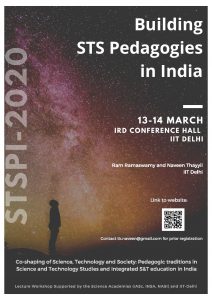 How should undergraduate science and technology education in India evolve in order to meet the challenges of the future? There has been considerable thought in this direction in the past few decades, resulting various steps like the inclusion of humanities and social sciences in the IITs and NITs as stand-alone courses for engineering students, increase in the number of integrated undergraduate science programs in older institutions like the IITs as well as the growth of new institutions such as IISERs, NISERs, CEBS. Some other institutions such as central universities, as well as some deemed-to-be universities, have also introduced basic science/technology programmes that integrate the Bachelors and Masters degrees. A salient feature of these “integrated” programmes are an increasing strong component of humanities and social science courses in these integrated science curricula, and a second feature is that atleast some of these programmes are strongly interdisciplinary. It is in this context that we would like to propose having a two-day workshop on Science and Technology Studies (STS), focusing specifically on pedagogy.
How should undergraduate science and technology education in India evolve in order to meet the challenges of the future? There has been considerable thought in this direction in the past few decades, resulting various steps like the inclusion of humanities and social sciences in the IITs and NITs as stand-alone courses for engineering students, increase in the number of integrated undergraduate science programs in older institutions like the IITs as well as the growth of new institutions such as IISERs, NISERs, CEBS. Some other institutions such as central universities, as well as some deemed-to-be universities, have also introduced basic science/technology programmes that integrate the Bachelors and Masters degrees. A salient feature of these “integrated” programmes are an increasing strong component of humanities and social science courses in these integrated science curricula, and a second feature is that atleast some of these programmes are strongly interdisciplinary. It is in this context that we would like to propose having a two-day workshop on Science and Technology Studies (STS), focusing specifically on pedagogy.
Science and Technology Studies have been crucial in developing existing traditions of Science, Technology Society scholarship into a cogent, interdisciplinary, and broad pedagogic program within the Humanities and Social Sciences. STS traditions across the world including India have brought together philosophical, historical and sociological enquiries in science/ technology/ medicine/ health/environment to emphasize the social nature of the scientific and technological enterprises. What are the contours and methods of an appropriate STS program in India that takes these concerns, multiple sites and disciplinary approaches seriously, both inside and outside the classroom?
A two-day workshop on STS at the IIT Delhi will serve several purposes. Pedagogic exposure to STS traditions can offer (future) scientists and technologists a perspective on the ways in which technical, scientific and social phenomena interact and influence each other. Humanities faculty who teach such courses within pure sciences/technology programs therefore need to reflect on the proper pedagogic methodologies that need to be employed for the purpose. While this will make for more engaged and reflexive scientists and technologists, it can also pave the way for a more engaged program within the Humanities and Social sciences – an engaged research program that takes the social institutions of technology and the sciences more seriously in their social analyses. What models of using STS for such integration of S&T education are available for us, what challenges and opportunities do we see before us, and what gaps and resources can we identify? And in what ways would such an exercise contribute to identifying the contours and methods of an appropriate STS program in India?
